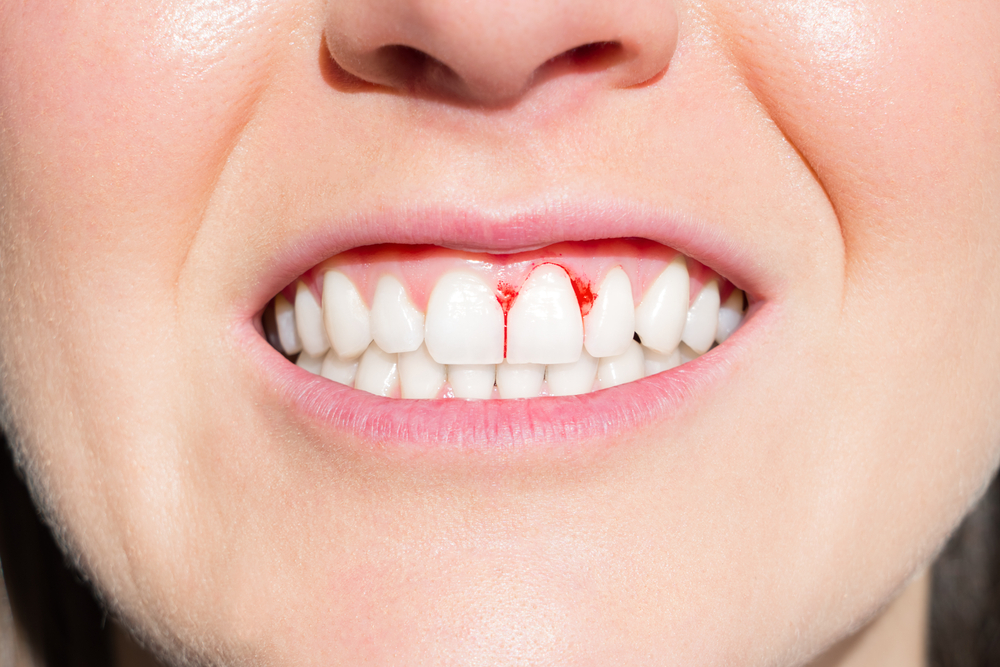 Experiencing bleeding gums can be alarming, yet many people notice that their teeth sometimes feel better or less sensitive when their gums bleed. This phenomenon might seem counterintuitive, but understanding the connection between gum health and overall oral comfort is crucial for maintaining a healthy smile. At Riverside Dental, we’re here to explain why this happens, the importance of healthy gums, and what you can do to protect your oral health.
Experiencing bleeding gums can be alarming, yet many people notice that their teeth sometimes feel better or less sensitive when their gums bleed. This phenomenon might seem counterintuitive, but understanding the connection between gum health and overall oral comfort is crucial for maintaining a healthy smile. At Riverside Dental, we’re here to explain why this happens, the importance of healthy gums, and what you can do to protect your oral health.
Why Do Gums Bleed?
Before diving into why your teeth might feel better when your gums bleed, it’s essential to understand what causes gums to bleed in the first place. Bleeding gums are often a sign of inflammation and irritation. This inflammation can be caused by several factors, such as:
- Gingivitis: The earliest stage of gum disease, gingivitis occurs when plaque buildup irritates the gums, causing them to become red, swollen, and prone to bleeding.
- Poor Oral Hygiene: Inadequate brushing and flossing can lead to plaque and tartar buildup, which irritates the gums, leading to bleeding.
- Aggressive Brushing: Brushing too hard or using a toothbrush with hard bristles can damage the delicate gum tissue, resulting in bleeding.
- Nutritional Deficiencies: A lack of essential nutrients like vitamin C can make your gums more susceptible to bleeding and inflammation.
- Medical Conditions and Medications: Certain health conditions, such as diabetes, and medications like blood thinners, can also contribute to bleeding gums.
Why Might Your Teeth Feel Better When Your Gums Bleed?
While it might sound surprising, some people report feeling temporary relief in tooth discomfort when their gums bleed. This could be due to several factors:
- Release of Pressure: When gums are inflamed and swollen, they put pressure on the teeth and surrounding tissues, leading to discomfort. When the gums bleed, the inflammation may temporarily reduce, relieving the pressure and providing a sense of relief.
- Improved Blood Flow: Bleeding gums increase blood flow to the area, which can temporarily reduce pain and sensitivity. The increased circulation may also deliver more nutrients and immune cells to the affected area, creating a short-term feeling of relief.
- Plaque Disruption: If your gums bleed during brushing or flossing, it could mean that you’re disrupting the plaque buildup that’s irritating your gums. This disruption may provide temporary relief as the plaque’s hold is weakened.
However, it’s crucial to understand that while your teeth might feel better momentarily when your gums bleed, bleeding gums are not a good sign. It’s often a symptom of underlying gum disease or other oral health issues that need to be addressed.
The Dangers of Ignoring Bleeding Gums
If your gums bleed regularly, it’s a warning sign that something isn’t right with your oral health. Gum disease, if left untreated, can progress from gingivitis to periodontitis, a more severe form of gum disease that can lead to tooth loss, gum recession, and even bone damage. Other risks of ignoring bleeding gums include:
- Tooth Sensitivity: As gums recede and pull away from the teeth, it exposes the tooth’s roots, making them more sensitive to temperature changes and pressure.
- Bad Breath: Chronic gum inflammation can create an environment where bacteria thrive, leading to persistent bad breath.
- Increased Risk of Systemic Health Issues: Studies have shown that untreated gum disease can be linked to systemic health problems like heart disease, diabetes, and respiratory infections.
Tips for Maintaining Healthy Gums
Maintaining healthy gums is essential for overall oral health and comfort. Here are some practical tips to keep your gums in top shape:
1. Practice Good Oral Hygiene
Brushing and flossing are your first line of defense against gum disease. Brush your teeth at least twice a day using a soft-bristled toothbrush and fluoride toothpaste. Make sure to brush along the gumline, where plaque tends to accumulate, but be gentle to avoid irritating the gums further.
Flossing once a day is equally important, as it removes plaque and food particles from between the teeth and beneath the gumline—areas a toothbrush can’t reach. If traditional flossing feels uncomfortable, try a water flosser or interdental brushes for a more comfortable experience.
2. Use Antibacterial Mouthwash
Adding an antibacterial mouthwash to your routine can help reduce plaque and bacteria that lead to gum disease. Look for mouthwashes that contain chlorhexidine or essential oils, as they are effective in controlling gingivitis. Using mouthwash after brushing and flossing can provide an additional layer of protection for your gums.
3. Schedule Regular Dental Checkups
Regular dental checkups and professional cleanings are crucial for maintaining healthy gums. At Riverside Dental, our team can spot early signs of gum disease and remove tartar buildup that you can’t eliminate with brushing and flossing alone. We recommend visiting your dentist at least every six months for optimal oral health.
Statistic: According to the American Dental Association (ADA), regular dental cleanings can reduce your risk of developing gum disease by up to 50%, emphasizing the importance of professional care in maintaining healthy gums.
4. Maintain a Balanced Diet
Your diet plays a significant role in the health of your gums. Eating a balanced diet rich in fruits, vegetables, lean proteins, and whole grains can provide the necessary nutrients, like vitamin C and calcium, that support gum health. Avoid excessive consumption of sugary and acidic foods, as they can contribute to plaque buildup and gum inflammation.
Tip: Crunchy fruits and vegetables like apples, carrots, and celery are particularly good for your gums, as they stimulate saliva production and naturally help clean teeth.
5. Quit Smoking
Smoking is one of the leading risk factors for gum disease. The chemicals in tobacco interfere with the normal function of gum tissue cells, making smokers more susceptible to infections and reducing blood flow to the gums. Quitting smoking not only improves gum health but also enhances your overall health and reduces the risk of severe dental issues.
What to Do If Your Gums Bleed
If you notice your gums bleeding regularly, it’s essential to take action rather than ignore the problem. Here’s what you can do:
- Review Your Oral Hygiene Routine: Make sure you’re brushing and flossing correctly and not applying too much pressure.
- Increase Hydration: Staying hydrated can help improve saliva flow, which is essential for maintaining a healthy oral environment.
- Use a Soft-Bristled Toothbrush: A soft-bristled toothbrush can clean effectively without damaging delicate gum tissue.
- Visit Riverside Dental: Scheduling an appointment with our experienced team allows us to assess your gum health and provide professional treatment if needed. We can guide you through improving your oral hygiene habits and recommend specific products tailored to your needs.
Take Action for Healthier Gums with Riverside Dental
Your gums are the foundation of your oral health, and bleeding gums are a sign that they need attention. While your teeth may feel better temporarily when your gums bleed, it’s crucial to address the underlying issues to prevent further complications. At Riverside Dental, we specialize in diagnosing and treating gum disease, offering personalized care to keep your gums healthy and your smile bright.
Ready to take control of your gum health? Don’t wait until bleeding gums become a more severe issue. Call Riverside Dental today at (435) 673-3363 to schedule your appointment or visit our website to book online. Let us help you achieve the healthy, comfortable smile you deserve!






 (435) 656-4441
(435) 656-4441 826 S 3000 E Ste 2
826 S 3000 E Ste 2
Leave a Reply